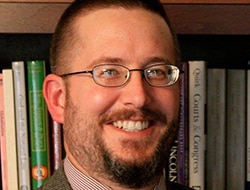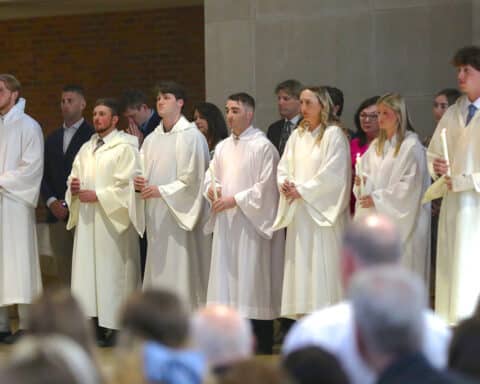
I was listening to a podcast when those words stopped me dead in my tracks. The host, a Catholic, was discussing a couple of high-profile evangelical megachurch pastors who recently had announced that they had lost their faith.
Sadly, we hear such stories all the time — often not involving megachurch pastors, but our own friends and relatives. The revelations about former cardinal Theodore McCarrick, the release of the Pennsylvania grand jury report on clerical sexual abuse, the various crises of the Church in Buffalo, Memphis and West Virginia — all of these have been used as excuses by Catholics to leave the Church.
I chose the word “excuses” intentionally. The reality is that many of those who have vanished from our pews over the past year had been only physically present for some years before that. As social pressure from friends and co-workers and family began to rise, they did not know how to answer the question: “Why do you stay in the Catholic Church?”
And so they left and cited one or another or all of these painful revelations as their reason why. But was it really?
What did they think they believed in? The Church as a human institution? Nolite confidere in principibus — put not your trust in princes, in the children of men in whom there is no salvation. The Nicene Creed? We don’t believe in the Creed; it’s a distillation of our belief. The words represent the truth of the reality of Christianity — a reality that underlies the intellectual formulas that we recite every Sunday.
That underlying reality is not an abstraction. He is a person: Jesus Christ.
When the megachurch pastors announced that they had lost their faith, what did that mean? That they no longer believed that Christ exists? Probably not. Most of those who have left the Church over the last year haven’t suddenly started doubting that Jesus Christ was born of Mary and founded the Catholic Church, any more than they doubt that George Washington led the Continental Army in the Revolutionary War, became the first president of the United States and retired to Mount Vernon. They believe in George Washington, and they believe in Jesus Christ.
The problem, though, is that too many Christians today believe in Jesus Christ in the same way that they believe in George Washington. Knowing Washington’s biography and his role in our history doesn’t change our lives in any significant way. Knowing Christ does.
If Christ is merely a historical figure who founded the Church to which we belong, then he’s nothing more than, say, Martin Luther or John Calvin or Henry VIII. But that’s not what Christians have ever believed.
“Faith is the realization of what is hoped for and evidence of things not seen” (Heb 11:1). We ask for, and receive, the gift of faith at our baptism. We receive the grace to know Christ — not to know him as we know George Washington or Martin Luther, but as I know my parents and my sisters and my wife and my children. This is the substance of our faith: to enter into a relationship with Jesus, with the God-made-man who is not an abstraction but is as real as the faces gathered around our dining-room table at Thanksgiving.
Ten years after Mother Teresa’s death, letters were published that revealed that she had spent nearly the last 50 years of her life suffering the dark night of the soul. She could no longer feel the presence of God; she had, as she put it, “no faith” — that is, no “evidence of things not seen.”
And yet, feeling “not wanted by God, repulsed, empty,” she continued to live as she had when she could feel the presence of Christ. The memory of that relationship pulled her forward, helped her to see the face of Christ in everyone she met, brought her back to the chapel and to Christ in the Eucharist every morning and every night.
Mother Teresa knew what she believed in — or, rather, whom. Do we?
Scott P. Richert is publisher for OSV.





